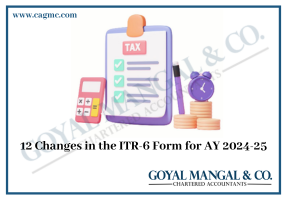 The globalized world we live in has facilitated cross-border mobility and financial transactions like never before. Non-Resident Indians (NRIs) play a significant role in this landscape, contributing to both their home country’s economy and the economies of their chosen foreign destinations. However, the complicated web of taxation can often be a cause of confusion for NRIs. This blog aims to provide clarity on navigating NRI taxation provisions, shedding light on key aspects that every NRI should be aware of.
The globalized world we live in has facilitated cross-border mobility and financial transactions like never before. Non-Resident Indians (NRIs) play a significant role in this landscape, contributing to both their home country’s economy and the economies of their chosen foreign destinations. However, the complicated web of taxation can often be a cause of confusion for NRIs. This blog aims to provide clarity on navigating NRI taxation provisions, shedding light on key aspects that every NRI should be aware of.
Meaning of NRI
NRI stands for “Non-Resident Indian.” An NRI is an individual of Indian origin or nationality who resides outside of India. This status is typically applied to those who live in another country for work, education, business, or personal reasons. NRI status is determined based on the number of days an individual spends in India during a financial year. Taxation for NRI Taxation provisions is explained thoroughly in this article. An individual is considered an NRI
- If they stay in India for less than 182 days during a financial year
- Or if their stay is less than 60 days in the relevant financial year and less than 365 days in the preceding four financial years.
Whether NRI Income Taxable or not?
According to the income tax regulations, an NRI’s income taxes in India will depend on his residency status for the tax year.
- Your international income is subject to tax in India if your status is “resident.” Your income generated or accumulated in India is taxable in India if your status is “NRI.”
- Examples of income gained or accrued in India include salary received in India or wages for services rendered here, income from a house property located in India, capital gains on the sale of an asset located in India, income from fixed deposits, and interest on a savings bank account. An NRI must pay taxes on these earnings.
- Indian tax laws do not apply to income obtained outside of the country by NRI
- Taxes are not applied to interest earned on FCNR and NRE accounts. In the hands of an NRI, interest on NRO accounts is taxed.
Is NRI required to file Income Tax Return?
Yes, NRIs (Non-Resident Indians) are required to file income tax returns in India if their total income from Indian sources exceeds the basic exemption limit that is 250000. NRI will be taxed on the NRI tax slab. Additionally, if they have any income that is subject to TDS (Tax Deducted at Source), filing a tax return is necessary to claim refunds or reconcile any excess tax deducted. It is essential for NRIs to understand their tax obligations and file returns as applicable to ensure compliance with Indian tax laws. The due date for filing return for NRI is 31st July of the A.Y.
Which ITR can be filed by NRI?
NRI can only file two income tax return that is ITR 2 or ITR 3
- ITR 2: NRIs with non-business and professional income must file the ITR 2. Additional income streams include rental property income in India, interest income, earnings from trading shares or selling property in India, and so on.
- ITR 3: When an NRI earns revenue in India from a business or profession, they must file ITR 3.
Advance Tax Payment for NRI
NRIs are required to pay advance tax if their tax obligation for a given fiscal year exceeds Rs 10,000. If advance tax is not paid, interest under Sections 234B and 234C is applicable.
Types of Taxable income for NRI
- Salary Income: If you work in India, your salary is termed Indian. Even if you are an NRI, India will tax your salary if it’s for services you give in India. Suppose you work for the Indian government and are an Indian citizen. If your service is outside India, your salary is taxable in India. Diplomats and Ambassadors earn tax-free income.
- Income from House property: An NRI must pay taxes on income from a property that is situated in India. This property may be rented or unoccupied. A 30% standard deduction, property taxes, and house loan interest can be claimed by an NRI. The NRI can deduct principal repayment under Section 80C. Section 80C allows property buyers to claim stamp duty and registration fees. House property income is taxed at slab rates.
- Rental payments to an NRI: When paying rent to an NRI owner, a tenant must remember to deduct TDS at the rate of 30%. Either an Indian account or the NRI’s account in the nation they are presently residing in may receive the money.
- Income from other sources: In India, the taxation for NRI of interest income derived from fixed deposits and savings accounts maintained in Indian bank accounts is taxable. The interest earned on Non-Residential External (NRE), and Foreign Currency Non-Residential (FCNR) accounts is exempt from taxation. The interest earned on Non-Resident Ordinary (NRO) accounts is subject to full taxation.
- Income from business & profession: The Income that NRI earned from setting up a business in India or a business controlled by India is taxable to NRI.
- NRI Capital Gain Tax: Any capital gain from transferring an Indian asset is taxable in India.
- India will tax capital gains on Indian shares and securities. The buyer will deduct 20% TDS from a long-term capital gain when selling a House property. However, investing in a house or capital gain bonds under Section 54 or 54EC can lead to exempt capital gains.

Investment income-related special provision
NRIs who earn from Indian asset investments pay 20% tax. NRIs who rely on special investment income and have TDS withheld are exempt from income tax.
Eligible investment for special provision is:
The following Indian assets purchased with foreign currency generate the following types of income:
- Stock in an Indian corporation, either public or private
- Debt issued by a public (rather than a private) Indian firm.
- Money deposited in banks and stock market
- Security provided by the Federal Government
- The remainder of the central government’s assets, as detailed in the official gazette.
- When figuring investment income, Section 80 deductions cannot be taken.
Long Term Capital gain special provision
The absence of indexation benefits and deductions under Section 80 precludes any advantages in terms of long-term capital gains arising from the sale or transfer of those overseas assets.
However, it is possible to obtain an exemption on the profit by utilizing the provisions outlined in Section 115F, provided that the profit is reinvested into:
- The equity securities of a company based in India
- The debentures issued by a publicly traded Indian corporation.
- The practice of placing funds in banking institutions and Indian public corporations.
- The topic of discussion pertains to securities issued by the central government.
- The concerns pertaining to the National Security Council (NSC) VI and VII.In this scenario, the exemption of capital gains is proportionate when the cost of the new asset is lower than the net consideration.
- If the newly acquired asset is transferred or sold within three years, any previously exempted profit will be included in the individual’s income in the year of the sale or transfer.
The above benefits may be available to non-resident Indians (NRIs) after they become residents if the asset is converted into money by selling within 3 years and they submit a declaration to the assessing officer requesting the special provisions. If the NRI Taxation provisions decline, their income (including investment income and long-term capital gains) will be taxed according to the Income Tax Act.
Deductions allowed to NRI
Following are the deductions that are allowed to NRI:
- LIC Premium under Sec 80C
- Tuition Fees under Sec 80C
- Principal repayment of home loan under Sec 80C
- Unit linked insurance plan under Sec 80C
- Equity linked tax saving scheme under Sec 80C
- Medical Insurance under Section 80D
- Interest paid on education loan under Sec 80E
- Payment made in the form of eligible donation under Sec 80G
- Interest on Saving bank account under Sec 80TTA
Takeaway
Navigating the complex world of navigating NRI taxation provisions may seem daunting, but with a clear understanding of the tax provisions, one can effectively manage their finances and obligations. Staying informed about NRI taxation provisions tax filing, status determination, income sources, investment taxation, and repatriation rules will empower NRIs to make well-informed financial decisions that benefit both their country of residence and their home country.







